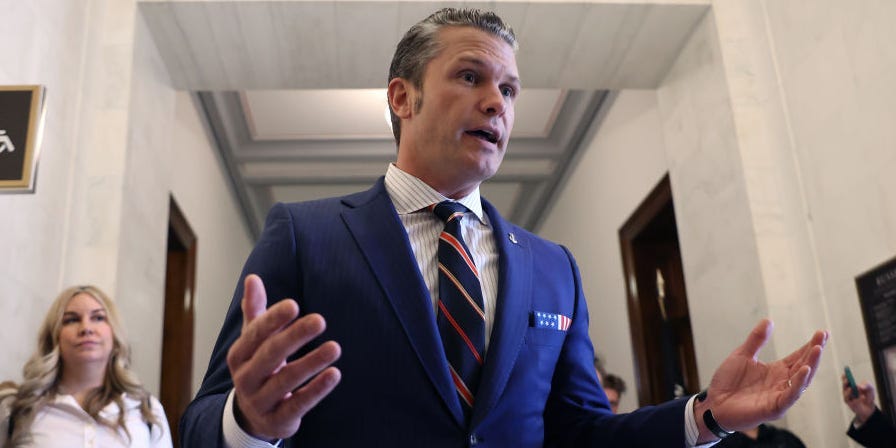Recently released West Point records shed new light on exactly how the December snafu over Pete Hegseth’s admission to the prestigious military academy happened.
On the morning of December 11, Hegseth wrote on X that the investigative news website ProPublica was about to run a “knowingly false” story saying that he hadn’t been admitted to the US Military Academy, where many of America’s Army officers are trained.
ProPublica denied Hegseth’s claim, saying it had simply asked Hegseth to respond to a statement by a West Point public affairs official who told the news outlet that Hegseth hadn’t even applied, much less been admitted.
At the time, Hegseth and his allies used the incident to blame West Point and the media. The new records show the mistake was West Point’s, which neglected to review an old archive of the academy’s thousands of past applicants before the controversy took off.
Internal emails, released to Business Insider under the Freedom of Information Act, showed West Point staffers exchanging emails on December 10 about Hegseth’s claim to have been admitted, after he produced a letter as proof.
“Look what they now provided??” Theresa Brinkerhoff, a public affairs official, wrote to another West Point employee.
In another email thread, an employee whose name was redacted wrote, “anyone can generate an acceptance letter…doesnt mean its legit.”
“Very true,” Brinkerhoff replied.
By the afternoon of the 10th, West Point staff seemed to have realized their mistake. “Hes in there,” an employee whose name was redacted wrote in an email. “Its in an old archived table,” the person said, typing out a line of search query language to demonstrate how the admissions record could be found.
“The record shows that he declined the offer,” the employee wrote.
Hegseth ended up going to Princeton, where he studied politics, played basketball, and joined the Reserve Officers’ Training Corps. He served in the Army National Guard after graduation and moved into conservative activism and media jobs.
Hegseth has been a magnet for criticism in his six months as defense secretary. His nomination to lead the Pentagon was looking uncertain last December amid allegations of alcohol abuse and mistreatment of women. Hegseth denied the claims and promised to stop drinking.
Terrence Kelley, the head of West Point’s communications office, apologized to ProPublica the afternoon of the 10th. “My sincere apologies for the incorrect information,” he wrote. “It was inadvertent.”
Hegseth apparently didn’t get the memo. He posted at 8:10 am the next day that ProPublica was about to run a false story.
Kelley told colleagues on December 11 that it was important that they get “official word” to ProPublica that Hegseth was telling the truth. “Confirming Hegseth’s claim probably kills any interest Propublica has in the story but the longer we delay response, the more likely that becomes a story,” he wrote.
In a later email to ProPublica, which never ran a story about Hegseth’s admission, he called the flub an “honest mistake.”
By the afternoon of the 11th, West Point’s press office had received inquiries about Hegseth’s post from eight other media outlets. That same day, Sen. Tom Cotton of Arkansas asked the school’s leadership to look into how the statement was made.
“The academy takes this situation seriously and apologizes for this administrative error,” West Point told media outlets.
“Following the release of inaccurate admissions information last December, West Point implemented additional guidance for the proper review and release of any information to outside parties,” Kelley, the West Point spokesperson, told BI. “We regret the error and are committed to ensuring it does not happen again.”
“Reporters do their job by asking tough questions to people in power, which is exactly what happened here,” a spokesperson from ProPublica said. “Responsible news organizations only publish what they can verify, which is why we didn’t publish a story once Mr. Hegseth provided documentation that corrected the statements from West Point.”
The Pentagon and Cotton didn’t respond to requests for comment.



